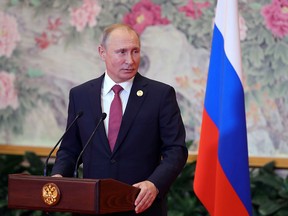Putin defends Trump's refusal to back G7 communique before once again suggesting a meeting
Putin noted that Russia and other members of the Eurasian Economic Union 'also have disputes and do not unanimously sign everything at the same time'

Article content
MOSCOW — President Vladimir Putin of Russia said Sunday during a visit to China that he would meet President Donald Trump “as soon as the American side is ready” but insisted Russia was in no hurry to win readmission to the Group of 7 nations because it belongs to a Chinese-led grouping that he described as more important.
Putting a brave face on a failed effort by Trump to have Russia readmitted to the world’s most exclusive diplomatic club, Putin said the G-7, which ended a cantankerous summit meeting Saturday in Canada, represented fewer people and had less economic heft than the Shanghai Cooperation Organization.
Putin was speaking at the end of the Shanghai grouping’s annual meeting of leaders in the Chinese port city of Qingdao. The Shanghai organization, which Beijing began in 2001 as an alternative to U.S.-dominated diplomatic groups, includes China, Russia, India, Pakistan and the nations of Central Asia.

These nations have more people, more land and, Putin said, more economic power when output is calculated by purchasing power parity, than the G-7, a grouping of U.S. allies, mostly in Europe. The seven countries used to dominate the world economy, but lost their edge as China and India surged and Europe and Japan stagnated.
The G-7 still represents nearly half the world’s total gross domestic product, but it has slipped behind the nations of the Shanghai Cooperation Organization, or SCO, when economic power is measured using a formula that adjusts for the relative value of currencies and their purchasing power.
“True, the seven are still richer in per capita income, as they say, but the SCO economies are larger, and their population is much larger, too — half the world’s population,” Putin told reporters in Qingdao, according to a transcript of his remarks issued by the Kremlin.
Expelled from the club of rich nations in 2014 after it seized Crimea from Ukraine, Russia has tried to rebrand itself as an Asian power rather than a European one, abandoning visions once eagerly embraced by Putin of a common economic space stretching from Lisbon to Vladivostok.
As part of its pivot to the East, Moscow has expanded ties with Beijing and built up its own regional economic and political bloc, known as the Eurasian Economic Union.
The shift has yielded only modest economic benefits, with Russia’s two-way trade with China still less than half what it is with Europe, but it has allowed Putin to slough off his country’s isolation from the West.

Asked in Qingdao about the G-7’s tumultuous meeting Friday and Saturday in Canada, Putin focused on the rift between Europe and the United States on tariffs, which he said “is more significant than any emotional outbursts.”
“As far as I know, the president of the United States said the U.S. is considering the possibility of regulating the additional supply of automotive equipment in the U.S. market,” he said. “This is a serious matter. This can really hurt the economic interests of so many countries, above all European, of course.”
But, in contrast to the United States’ allies, the Russian president expressed understanding for Trump’s decision that the United States would not sign the summit’s final statement.
Noting that Russia and other members of the Eurasian Economic Union “also have disputes and do not unanimously sign everything at the same time,” he played down the furor over Trump’s undiplomatic diplomacy: “We can see that there are internal problems there. Well, it happens.”
He also said he agreed with Trump on the need for a meeting between the leaders of Russia and the United States.

“The president of the United States has repeatedly said that he considers this meeting expedient,” he said, “and I agree that this is indeed the case.”
Putin said that during his last telephone conversation with the U.S. president, Trump “expressed his concern about the threat of a new round of the arms race.”
“I agree with him,” he said.
He said a personal meeting with Trump would help both countries, whose relations have plunged to their lowest ebb in decades after a series of tit-for-tat sanctions and diplomatic expulsions.
“As soon as the American side is ready, this meeting will be held immediately, depending on my work schedule,” Putin said.
Austria and other European countries, he said, have been discussed as a possible venue for a U.S.-Russia meeting.
“But I think this is a technicality,” he said. “What is important is that the meeting, if it takes place, is filled with specific content.”






Postmedia is committed to maintaining a lively but civil forum for discussion. Please keep comments relevant and respectful. Comments may take up to an hour to appear on the site. You will receive an email if there is a reply to your comment, an update to a thread you follow or if a user you follow comments. Visit our Community Guidelines for more information.